
by pestcontrolseos | Oct 17, 2024 | Blog, Pest Info & Articles
Orange oil treatment is one of the new, trendy treatments by its natural properties and effectiveness. It is derived from orange peels, showing not only a fragrance but also some practical uses. It really interested those who find solutions in nature for pest control and household maintenance. This blog post will explore five essential facts about orange oil treatments, highlighting their uses and benefits. Whether you are new to this treatment or considering alternatives, understanding these facts can help you make informed choices.

Fact 1: What is Orange Oil Treatment?
Orange oil treatment is extracted from orange peels through cold pressing. The oil obtained is a concentrated liquid containing the chemical d-limonene. This chemical has very miraculous properties that can be realized. The oil does not poison humans or pets, and it is the recommended answer for anybody who wants to steer clear of chemicals. Its lovely citrus fragrance, for example, is a nice bonus, leaving the spaces smelling fresh and clean.
Pest Control with Orange Oil
Orange oil proved to be very beneficial in controlling against termites and other regular pests. Its active agent, d-limonene, passed through the exoskeleton of an insect to cause its death. Such makes it one of the best alternatives for traditional chemical methods. Orange oil treatments are popular among homeowners and pest controllers as they attack infestation sources without any impact on the surroundings or the quality of indoor air.
Fact 2: The Benefits of Using Orange Oi
There are several benefits to orange oil. While it is used as a pesticide, its use does not start there. Cleaning products, natural degreasers, personal care products, and so on utilize orange oil. Because of its antibacterial properties, it is effective in giving freshness to the atmosphere and keeping places clean and hygienic. Orange oil is also biodegradable. Therefore, it can be used without posing harm to the environment. This is aligned with the current trend in the market: those that are sustainable or even environmentally friendly.
Health and Safety Advantages
Orange oil is safe to use around kids and pets. This oil will not give off any noxious fumes, something synthetic pest control and cleaning agents sometimes do, so it would make a great product for a home when health and safety are the top concerns. Furthermore, as a natural product, it tends to be less irritating and not likely to provoke an allergy, so that’s good peace of mind with its use.
Fact 3: How to Use Orange Oil Treatments
Using orange oil treatments is straightforward and can be done by both professionals and individuals. For pest control, it is usually applied directly to affected areas or injected into wooden structures where termites are present. In cleaning, it can be diluted with water and used on various surfaces to remove stains and grime. It is important to follow instructions on product labels to ensure effective and safe usage.
DIY Applications
For those interested in do-it-yourself projects, orange oil can be used in homemade cleaning solutions. Combine it with vinegar or baking soda for an effective cleaning agent that works on countertops, floors, and more. Its natural fragrance also makes it a popular choice for making air fresheners and scented candles. This ability to integrate into everyday products demonstrates its versatility and practical value.
Fact 4: Cost-Effectiveness of Orange Oil
While some may think natural solutions are costly, orange oil treatments are often cost-effective. The initial investment may be slightly higher than standard chemical treatments, but the long-term benefits outweigh the costs. Its effectiveness means fewer applications are needed, reducing overall expenses. Additionally, using it as a multipurpose product can save money on purchasing separate cleaning agents and pest control products.
Long-term Savings
By opting for orange oil treatments, homeowners can enjoy long-term savings. Its durability and the reduced need for frequent applications mean less money is spent over time. Furthermore, its use in multiple applications decreases the need to buy various products, further enhancing its cost-effectiveness.
Fact 5: Environmental Impact of Orange Oil
Using orange oil treatments supports environmental sustainability. As a natural product, it is biodegradable and does not contribute to pollution. This is crucial in today’s world, where reducing our carbon footprint is essential. By choosing orange oil, consumers are making a conscious decision to support eco-friendly practices.
Supporting Green Initiatives
Businesses and individuals alike are increasingly seeking products that align with green initiatives. Orange oil fits this trend perfectly, as it is derived from renewable resources and does not harm the ecosystem. Supporting such products encourages more companies to invest in sustainable practices, benefiting the planet as a whole.
Harnessing the Natural Benefits of Orange Oil Treatments for a Sustainable Home
Orange oil treatment is a powerful, natural alternative for various applications, offering benefits in pest control, cleaning, and more. Its safety, effectiveness, and eco-friendly nature make it an attractive option for those looking to avoid chemicals. Understanding these five facts about orange oil treatments highlights their potential as a reliable solution for modern needs. By incorporating orange oil into your routine, you can enjoy a cleaner, healthier, and more sustainable environment.
Discover the power of nature with Dr. Termites’ premium orange oil treatments. Embrace a healthier, eco-friendly lifestyle today. Join us in our journey towards sustainability and let’s make your home cleaner and safer, naturally. Visit us now to learn more!
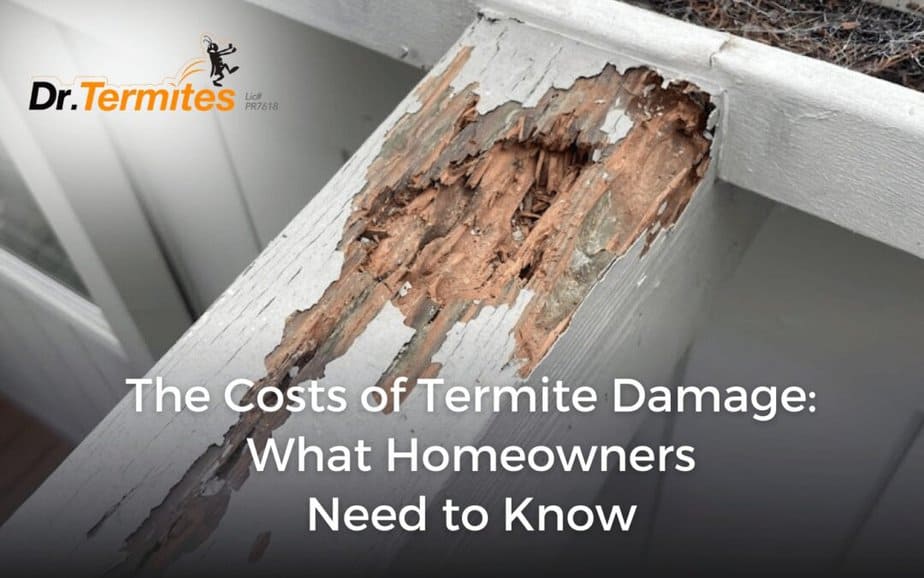
by pestcontrolseos | Oct 10, 2024 | Blog, Pest Info & Articles
Termites damage a house’s structure; if not detected early, they can cause considerable repair expenses. Knowing the implications and costs of termite infestation for homeowners is very important. Here’s a post that will walk you through the monetary effects, signs of infestation, and how to protect your property effectively.
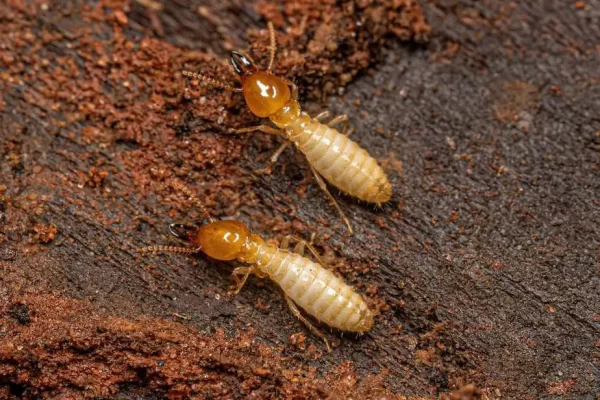
What Are Termites?
Termites are tiny pests that feed on wood and other materials containing cellulose. They live in colonies and can cause extensive damage to buildings. The most common types damaging homes are drywood termites and subterranean termites. Each type has specific habits but both can lead to costly repairs if left unchecked.
Signs of Termite Infestation
Knowing the signs of a termite infestation can save you a lot of money and stress. Look for these common indicators:
- Mud Tubes: Subterranean termites build these tunnels to travel between their nest and food source.
- Discarded Wings: Swarming termites shed their wings once they find a new place to build a colony.
- Hollow Wood: Tap wooden structures; a hollow sound can indicate termites have eaten away the interior.
- Frass (Termite Droppings): Drywood termites leave behind small, pellet-like droppings near infested areas.
The Financial Impact of Termite Damage
Repair Costs
Termite damage comes at a cost. Homeowners might pay thousands of dollars for repairs and treatments. The national average cost to repair termite damage could be as high as $3,000. However, this may vary depending on the extent of the damage and how large the house is. In some cases, it may call for the replacement of entire sections of structural wood, and this affects not only the safety of the house but also its value. Excessive destruction often requires major renovation, which is both time-consuming and costly.
Insurance and Termite Damage
Most home insurance policies do not cover termite damage, and termites are considered a preventable problem for which insurance companies will often require separate coverage or a specific policy to cover these costs. This makes regular inspections and preventive measures even more necessary. Homeowners have to turn all their attention and seek additional coverage specifically for termite damage, adding to annual expenses, but this does provide peace of mind.
Prevention Costs
Although termite infestations can be prevented at a cost, it will cost much less than the repair bills. It is important that your home be maintained by frequent inspections, treatments, and preventive measures. You can hire professional pest control companies that protect your home from termites, especially in regions with a high probability of infestation. Saving money in prevention keeps you problem-free, with peace of mind knowing that your home is protected from such pests.
Protecting Your Home from Termites
Regular Inspections
Scheduling regular inspections with a professional can help catch termite problems early. Experts recommend annual inspections, but in high-risk areas, more frequent visits may be necessary. An inspection can reveal not only the presence of termites but also conditions that might be conducive to future infestations. Early detection can save significant repair costs by addressing the problem before it becomes severe.
Wood Treatments and Barriers
Using treated wood and installing physical barriers during construction can deter termites. Applying termiticides to the soil around your home’s foundation creates a chemical barrier against these pests. These barriers can be especially effective in environments where termites are a frequent problem. Additionally, ensuring that wood surfaces are sealed and protected from moisture can reduce attractiveness to termites, as they thrive in moist environments.
Professional Pest Control Services
Hiring a pest control service is the best defense against termites. Professionals use advanced techniques to effectively manage and prevent infestations. In areas like California, termite control offers tailored solutions for the local environment. These services ensure your home is protected with the latest technologies, providing both immediate and long-term protection.
DIY Prevention Tips
While professional services are helpful, homeowners can take basic steps to prevent termites. Keeping gutters clean and ensuring proper drainage around the home can reduce moisture, a key factor attracting termites. Promptly repairing leaks and maintaining a gap between soil and wood can further deter these pests. Regularly checking these areas can help protect your home from potential infestations.
Protect Your Home: The Importance of Termite Prevention and Treatment
Termite damage can lead to substantial financial burdens for homeowners. Recognizing the signs of an infestation early and investing in preventive measures are crucial steps in protecting your home. By understanding the costs involved, you can make informed decisions to safeguard your property from these destructive pests. Regular maintenance and professional help play a key role in minimizing risks and preserving the value of your home. With the right approach, you can ensure your home remains a safe and sound investment for years to come, keeping it protected from the costly damage termites can inflict.
Don’t let termites undermine your investment. Contact Dr. Termites today to schedule a comprehensive inspection and protect your home with our proven prevention and treatment solutions. Ensure your peace of mind by making the smart choice for your property’s future.
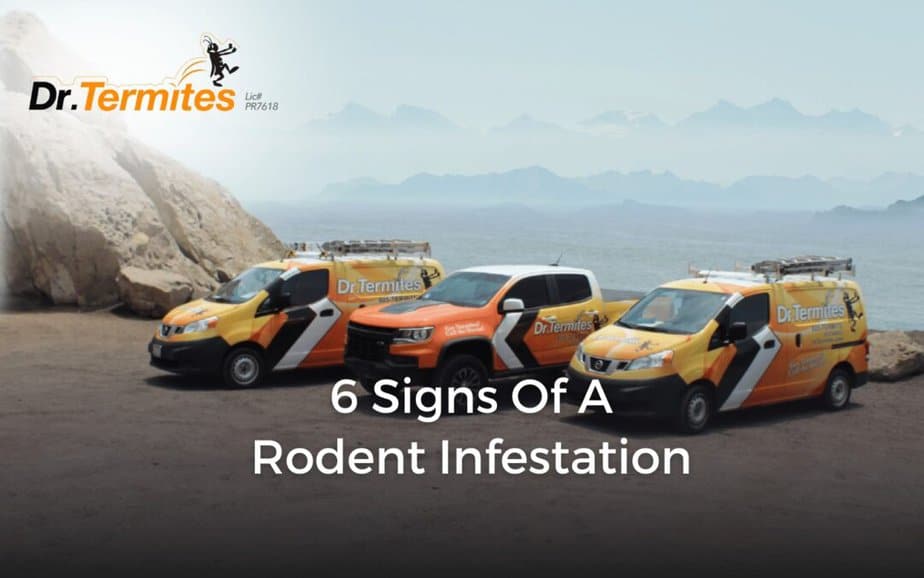
by pestcontrolseos | Oct 3, 2024 | Blog, Pest Info & Articles
Rodents are more than just unwelcome guests in your home; they can be a real problem. Recognizing the signs of a rodent infestation early can save you time and trouble. This guide will help you understand what to look for if you suspect these critters have taken up residence in your space. By knowing these signs, you can take action before the issue becomes serious.
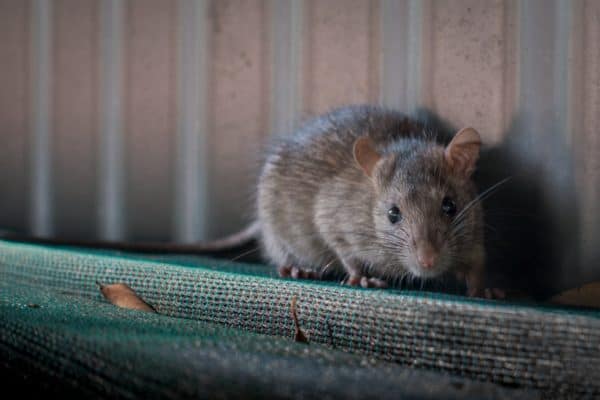
1. Droppings and Urine Odors
One of the first indicators of a rodent problem is the presence of droppings. These tiny telltale signs can be found in various places around your home.
What Do Droppings Look Like?
Rodent droppings are small, dark, and pellet-shaped. They resemble grains of rice and can often be found in areas where food is stored, such as pantries or cupboards. The more droppings you see, the larger the infestation may be.
The Smell of Urine
Rodents also leave behind a distinct, musky odor from their urine. This smell can be quite strong, especially in enclosed areas like attics or basements. If you notice a persistent, unpleasant smell, it could be a sign of an infestation.
2. Gnaw Marks
Rodents need to gnaw on things to keep their teeth sharp. This natural behavior can lead to significant damage if left unchecked.
Where to Look for Gnaw Marks
Check for gnaw marks on furniture, walls, and food packaging. These marks are often found on wood, wires, and other soft materials. If you see signs of chewing, it might be time to investigate further.
Damage to Food and Containers
Rodents can chew through cardboard and plastic to reach food. If you notice holes or tears in food packaging, it’s a clear sign that rodents are around.
3. Noises in the Walls
Hearing strange noises, especially at night, can be unsettling. These sounds are often a clear sign of rodents in the home
What Do Rodent Noises Sound Like?
Rodents are most active at night, so you may hear scratching, scurrying, or squeaking sounds in the walls or ceiling. These noises can be a sure sign of mice or rats moving around.
How to Track Noises
Pay attention to where the noises are coming from. This might help you locate the rodents’ main area of activity, which can be useful for setting traps or placing deterrents.
4. Nests or Burrows
Rodents build nests to live and breed in. Their nests are often well-hidden but can be found with careful searching.
What Are Rodent Nests Made Of?
Look for nests made from shredded paper, fabric, or insulation. These materials provide warmth and comfort for rodents to raise their young.
Common Nesting Locations
Nests are often found in hidden, quiet areas such as behind appliances, in attics, or under floors. If you discover a nest, it’s a sign that your rodent problem may be more extensive than you thought.
5. Tracks and Runways
Rodents often use the same paths repeatedly, leaving behind evidence of their travels.
Spotting Tracks
Look for tracks or greasy marks along walls and baseboards. These marks are left by the oils in rodents’ fur as they travel along their usual routes. The tracks can be subtle but are usually noticeable upon close inspection.
Using Flour or Powder
To confirm activity, you can sprinkle a thin layer of flour or talcum powder on suspected paths. Check for tracks the next day to see if rodents have been active. This simple trick can help you identify the extent of rodent movement in your home.
6. Pet Behavior Changes
Sometimes your pets can sense rodents before you do. Dogs and cats have heightened senses that can pick up on the presence of rodents.
How Pets React to Rodents
Dogs and cats may become more alert or agitated in certain areas of the house. They might sniff around or try to dig at walls or floors where rodents are present. Pay attention to their behavior, as it can give you clues about hidden rodent activity.
Observing Unusual Pet Behavior
If your pet shows interest in a specific area, it might be worth investigating for signs of rodent activity. Unusual behavior from your pets can be an early warning sign of a rodent issue.
Proactive Strategies for Effective Rodent Management
Spotting the signs of a rodent infestation early can prevent bigger problems down the road. By being aware of droppings, gnaw marks, strange noises, nests, tracks, and changes in pet behavior, you can act quickly to address the issue. If you suspect a rodent problem, consider reaching out to a pest control professional to help manage the situation. Taking prompt action can protect your home from further damage and health risks associated with rodents. Be vigilant and proactive to safeguard your living space.
Protect your home from unwanted guests with Dr. Termites‘ expert rodent control in Ventura. Don’t wait for the problem to worsen. Contact us today and ensure a safe, rodent-free environment for you and your family.

by pestcontrolseos | Sep 19, 2024 | Blog, Pest Info & Articles
Orange oil is highly promoted as the most organic means of controlling pests-mostly termites and ants. It provides an eco-friendly means of dealing with infestations in a safe manner because toxic chemicals are avoided. People prefer orange oil nowadays because it comes straight from nature and, therefore, can never harm the environment or household members in terms of health. This post is going to detail the manner in which you can use orange oil to eliminate those pesky terms and ants in a very clean way for your house.
What is Orange Oil?
Orange oil is a type of essential oil extracted from the peels of oranges. This oil is beautifully fragrant and contains a compound called d-limonene-a compound that is effective in pest killing. D-limonene is said to be the active component attributed to the ability of orange oil in fighting pests, thus widely popular today.
How Does Orange Oil Work Against Pests?
Orange oil acts as a dispersant, where it breaks the exoskeletons of insects, causing them to die. The strong smell of the oil complicates matters for the ants and exposes their pheromone trails used for communication in the movement. As a result, it becomes impossible for them to find back. At the end of things, orange oil controls termite infestations and ant infestations since it has both functions.
Benefits of Using Orange Oil for Termites
One of the significant benefits of using orange oil against termites is that it actually enters into the wood and deep into the secret of the termites. This would allow for a more complete and effective treatment. Orange oil is also safe to use with pets and children, hence a favorite among families.
How to Apply Orange Oil for Termite Control
For termite treatment, orange oil is usually injected directly into the infested wood. This allows the oil to reach the termites and eradicate them efficiently. Professional pest control services can perform this task to ensure accuracy and effectiveness.
Advantages of Orange Oil for Ant Infestations
In the case of ants, orange oil is also similarly effective. Because orange oil is naturally odor-free, its application in kitchens and other preparation places is entirely safe. Orange oil helps keep ants away for good by removing the scent trails left by the ants.
Using Orange Oil for Ant Prevention
To prevent ants from entering your home, you can use orange oil as a barrier. Simply apply it around entry points such as window sills and door frames. This creates a protective layer that keeps ants at bay while leaving your home smelling fresh.
Orange Oil Treatment in Ventura
In places like Ventura, where pest control is essential, many homeowners are opting for Orange Oil Treatment. This method offers peace of mind, knowing that the solution is both effective and environmentally friendly. Residents can enjoy a pest-free home without the worry of harmful chemicals.
Why Choose Orange Oil Over Chemical Treatments?
Orange oil is not only effective but also sustainable. Unlike traditional chemical treatments, it does not leave harmful residues or contribute to pollution. Choosing orange oil is a step towards a greener planet while maintaining a pest-free home.
Environmental Impact
Using orange oil contributes positively to the environment. It is biodegradable and poses no threat to wildlife or beneficial insects. This makes it an ideal choice for eco-conscious consumers.
Cost-Effectiveness of Orange Oil
One of the appealing aspects of using orange oil is its cost-effectiveness. While traditional pest control methods can be expensive due to repeated applications, orange oil often requires fewer treatments, reducing overall costs. This makes it a budget-friendly option for homeowners who want effective pest control without breaking the bank.
Long-Term Benefits
Investing in orange oil treatment provides long-term benefits. Its ability to eliminate pests at their source reduces the likelihood of re-infestations. This longevity in effectiveness means fewer headaches and more savings over time.
Steps to Use Orange Oil Safely
Applying orange oil is straightforward, but there are steps to ensure safety and effectiveness. It’s important to follow recommended guidelines and quantities. Typically, a small amount is enough to cover large areas, ensuring that you’re not overusing the product.
Professional Assistance
While DIY applications are possible, professional pest control services can provide precision and expertise. They have the tools and knowledge to identify the exact needs of your home and apply orange oil in the most effective manner.
Eco-Friendly Pest Control: Harnessing the Power of Orange Oil
Orange oil is a safe and effective method for treating both termite and ant infestations. Its natural properties make it an excellent alternative to chemical treatments, ensuring safety for your family and pets. By opting for orange oil, you can maintain a healthy living space and contribute to environmental sustainability. Whether you are in Ventura or elsewhere, considering orange oil treatment can provide a simple and effective solution for pest control.
Ready to safeguard your home with a natural solution? Contact Dr. Termites for Orange Oil Treatment in Ventura. Our expertise ensures your space remains pest-free, safe for family and pets. Choose environmental sustainability and effective pest control. Call us now and embrace a healthier living environment today!
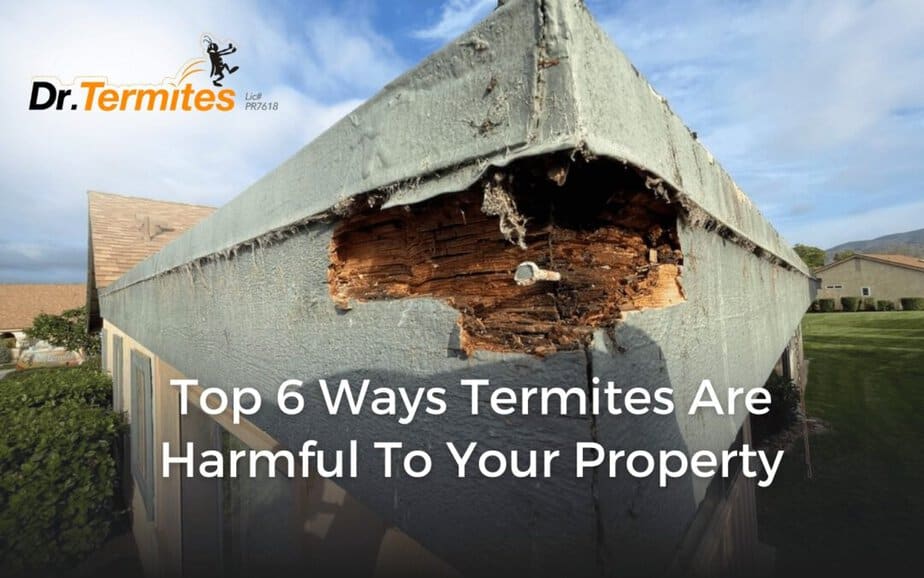
by pestcontrolseos | Sep 13, 2024 | Blog, Pest Info & Articles
Termites are tiny insects that can cause big problems for homeowners. Known as “silent destroyers,” they often go unnoticed until significant damage has been done. These pests feed on wood and other materials, leading to costly repairs and structural issues. In this blog post, we will look at six ways termites can harm your property. Knowing these impacts can help you take steps to protect your home and avoid major damage.

1. Structural Damage
Weakening of Foundations
Termites mainly feed on wood, and if they infest your home’s wooden structures, they can significantly weaken the foundation. This can lead to sagging walls, creaking floors, and even collapses in some areas. Damage is often hidden until it becomes severe, making early detection difficult. Homes with wooden foundations are especially vulnerable, so regular inspections are crucial to identify issues early and prevent serious consequences.
Damage to Support Beams
Support beams are essential for your home’s structural integrity. When termites invade, they can damage these beams, compromising their strength and stability. This impacts your home’s safety and can lead to costly repairs. Replacing damaged beams needs professional help, which can be time-consuming and expensive.
2. Devaluation of Property
Reduction in Property Value
A termite infestation can significantly reduce the value of your property. Potential buyers are often wary of purchasing homes with a history of termite damage, fearing the cost of repairs and the possibility of future infestations. This can make it difficult to sell your home at its true market value. Buyers may request detailed inspections and reports, which can further delay the selling process.
Costly Repairs
Repairing termite damage is not only expensive but also time-consuming. Homeowners may find themselves facing extensive repair bills that can strain their finances. The longer an infestation goes undetected, the higher the repair costs will be. In some cases, severe infestations may require complete remodeling of affected areas.
3. Damage to Wooden Structures
Attacks on Wooden Furniture
Termites don’t just limit themselves to the structural wood of your home; they can also target wooden furniture. Chairs, tables, and cabinets are all at risk, which can lead to the loss of valuable items and the need for costly replacements. This can be especially distressing for items that have sentimental value or are antiques.
Destruction of Doors and Windows
Doors and windows are also susceptible to termite damage. As these pests eat away at the wood, it can cause doors and windows to warp, making them difficult to open and close. This can also affect the security of your home. Warped doors and windows might allow drafts to enter, increasing energy costs.
4. Compromise of Safety
Creation of Unsafe Living Conditions
As termites eat away at the wood, they create hollow spaces that compromise the safety of your living environment. This can pose serious risks, particularly in severe cases where structural components are affected, potentially leading to accidents or injuries. Ensuring regular professional inspections can help mitigate these risks.
Increased Risk of Collapses
If termite damage is extensive, it can lead to the collapse of parts of your home. This is especially concerning for floors and ceilings, which can suddenly give way if their support structures are compromised. Such collapses are not only dangerous but can also lead to significant repair costs and even temporary displacement.
5. Hidden Infestations
Difficulty in Detection
Termites are known for their ability to remain hidden. They often infest areas that are out of sight, such as within walls or beneath floors, making them difficult to detect. By the time you notice visible signs of damage, the infestation is usually well established. Regular inspections by pest control professionals can help catch these infestations early.
Silent and Stealthy
Unlike other pests, termites do not make noise or leave obvious traces like droppings. Their silent nature means they can quietly cause destruction over long periods without being detected. Homeowners should be vigilant for subtle signs like discarded wings or mud tubes.
6. Long-Term Consequences
Continuous Damage Over Time
If left unchecked, termites can cause continuous damage over many years. This not only leads to ongoing repair costs but can also result in long-term structural issues that affect the livability of your home. Consistent termite control measures are essential to avoid such persistent damage.
Impact on Future Renovations
Termite damage can also complicate future renovations. The presence of weakened structures might require additional work to ensure that any new constructions are safe and stable. This can increase the cost and duration of renovation projects.
Protect Your Home: The Importance of Termite Prevention and Control
Termites may be small, but their impact on your property can be enormous. From structural issues to financial burdens, the risks are significant. Regular inspections and prompt action at the first sign of termites are critical in protecting your home. By staying vigilant and informed, you can prevent termites from causing irreparable harm to your property, ensuring a safe and sound environment for you and your family.
Protect your home with Dr. Termites, the experts in termite control in Ventura. Don’t let termites cause irreparable damage. Contact us today for thorough inspections and effective termite control solutions. Ensure your property’s safety and integrity now!
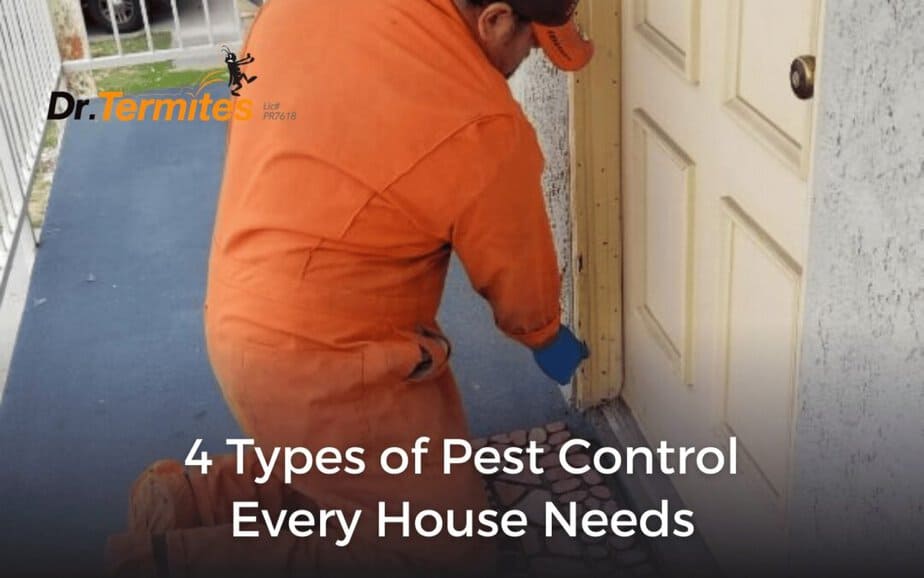
by pestcontrolseos | Sep 4, 2024 | Blog, Pest Info & Articles
When it comes to keeping your home safe and comfortable, dealing with pests is a key part of the process. Pests can cause significant damage and pose health risks to your family. That’s why professional pest control is essential. This blog post will cover four types of pest control that every house needs: general pest control, rodent control, termite control, and bed bug control. Understanding these services can help you maintain a pest-free home and ensure the well-being of your household.

General Pest Control
General pest control is the first line of defense against common household pests. This service typically covers a wide range of insects and critters, including ants, spiders, and cockroaches. Regular treatments help prevent infestations before they start, protecting your home from unwanted guests. Professionals use safe and effective products to treat known hotspots in and around your home, creating a barrier that keeps pests out.
Seasonal Treatments
Residential pest control services often include seasonal treatments to address the specific pests that are more active during certain times of the year. This proactive approach ensures that your home remains secure year-round, minimizing the risk of infestations.
Benefits of General Pest Control
- Health Protection: Keeps harmful pests away, reducing the spread of diseases.
- Property Preservation: Protects furniture and home infrastructure from damage.
- Peace of Mind: Regular treatment schedules mean fewer worries about surprises.
Common Pests Covered
- Ants: Can contaminate food supplies and damage structures.
- Spiders: Some can be venomous; control is necessary to prevent bites.
- Cockroaches: Known for spreading germs and causing allergies.
Rodent Control
Rodents, such as mice and rats, can cause extensive damage to your home. They chew through wires, insulation, and even structural elements, leading to costly repairs. Professional rodent control involves identifying entry points, setting traps, and using bait stations to reduce rodent populations.
Preventive Measures
Experts also focus on preventive measures like sealing gaps and holes where rodents might enter. By addressing these vulnerabilities, residential pest control services help prevent future infestations, keeping your home rodent-free.
Additional Focus Areas
- Sanitation Practices: Keeping food sealed and trash covered to avoid attracting rodents.
- Ongoing Monitoring: Regular checks to ensure that preventive measures are working.
Health Risks of Rodents
- Disease Transmission: Rodents can carry diseases like hantavirus and salmonella.
- Allergy Trigger: Rodent droppings can trigger allergies in sensitive individuals.
Termite Control
Termites are known for silently destroying homes from the inside out. These insects feed on wood and can cause significant structural damage if not addressed promptly. Professional termite control is crucial for detecting and eliminating these pests.
Inspection and Treatment
Termite control begins with a thorough inspection of your home to identify any signs of termite activity. Once detected, professionals use treatments such as liquid barriers or bait systems to eliminate termites and protect your home. Regular inspections are recommended to ensure that termites do not return.
Signs of Termite Activity
- Mud Tubes: Small tubes along walls or foundations.
- Hollow Wood: Wood that sounds hollow when tapped.
- Discarded Wings: Found near windows or doors.
Importance of Early Detection
- Cost Savings: Early detection can prevent costly repairs.
- Structure Safety: Protects the structural integrity of your home.
Bed Bug Control
Bed bugs are small but mighty pests that can cause sleepless nights and itchy bites. They are notoriously difficult to eliminate without professional help, as they hide in mattresses, furniture, and even cracks in the walls.
Comprehensive Solutions
Professional bed bug control involves a comprehensive approach, including heat treatments, chemical applications, and thorough inspections. These methods ensure that all bed bugs and their eggs are eradicated, providing you with peace of mind and a good night’s sleep.
Tips to Identify Bed Bugs
- Bite Marks: Itchy red welts on skin, often in a line.
- Dark Spots: Bed bug excrement on sheets or mattresses.
- Musty Odor: A strange, musty smell in the affected areas.
Why Professional Help is Crucial
- Effective Eradication: Professionals have the tools and knowledge for complete elimination.
- Prevention Tips: Expert advice on preventing future infestations.
Guarding Your Sanctuary: The Essential Guide to Residential Pest Control
Professional pest control is not a luxury; it’s a necessity for maintaining a safe and healthy home. By investing in residential pest control services, you can effectively manage and prevent infestations of common pests like rodents, termites, and bed bugs. Remember, each type of pest requires a specific approach, and professionals are equipped with the knowledge and tools to handle them efficiently. Protect your home and family by making pest control a regular part of your home maintenance routine. Regular inspections and treatments can save you from costly repairs and ensure that your living space remains a haven for you and your loved ones.
Don’t let pests take over your sanctuary. Choose Dr. Termites for top-tier residential pest control in Ventura. Our expert team guarantees a pest-free home with our efficient, tailored solutions. Act now to protect your home and family—schedule your inspection with Dr. Termites today!








































